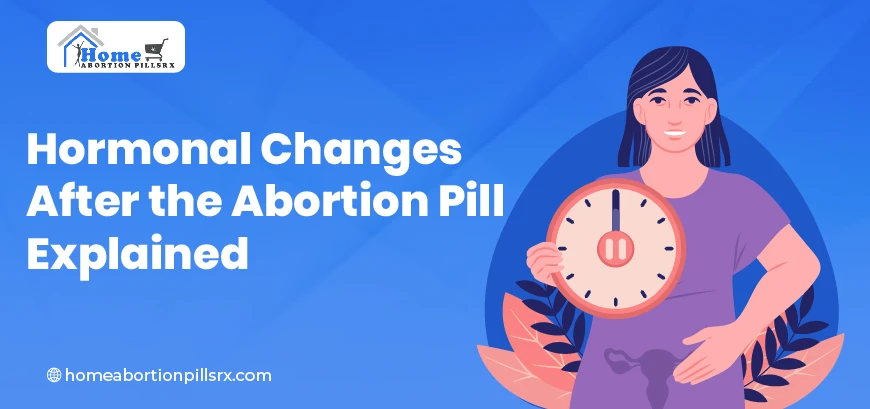Hormonal Changes After the Abortion Pill Explained

Abortion pills are widely known as medications that terminate pregnancy. However, not everyone knows the method involves hormonal changes to empty the uterus. Both pregnancy and the abortion process revolve around hormones and how they interact. We will concentrate on understanding hormonal changes after abortion pill and the aftereffects on not just hormones but the menstrual cycle, in this blog.
What is the Hormonal Function of Abortion Pills?
Here are some changes to expect from Mifepristone and Misoprostol abortion pills:
1. Mifepristone Abortion Pill Hormonal Changes: Certain pregnancy hormones are inhibited by medications that eliminate pregnancy from the body. Mifepristone tablets, for example. The endometrial lining sheds as a result of its anti-progesterone effects. Because it provides the endometrial lining with additional nourishment, progesterone helps maintain the tissues of the fetus. It also allows the pregnancy to stay attached to the uterine wall. The uterine lining weakens and eventually disintegrates as a result of the hormone’s absence.
2. Misoprostol Pill Hormonal Changes: The Misoprostol tablets are taken 24 to 48 hours after Mifepristone. They cause some post-abortion hormone symptoms such as cervical dilatation and uterine contractions. Surgeons may use Misoprostol to expand the cervix and aid with labor during childbirth. The loose conception products are expelled as a result of the womb’s contractions. Your vaginal bleeding becomes heavy as the pregnancy parts start to exit. Everything is normal because the bleeding is an expected side effect of the procedure rather than a cause for concern.
After Pregnancy Termination Hormone Changes
You have to go to a facility for a full abdominal ultrasound exam two weeks after finishing the course of abortion tablets. The test will show whether or not the uterus has emptied correctly. Although uncommon, a partial pill-assisted pregnancy termination is not impossible. You must take all necessary measures and heed your healthcare provider’s recommendations to ensure that the medications function as intended.
1. Progesterone and Estrogen Hormone: The hormonal changes after abortion pill include progesterone levels returning to normal. After the uterus empties, this hormone continues to decline. Additionally, the body adapts to physiological changes to return to the period before pregnancy. Estrogen levels fluctuate as a result of this.
2. Cervix and Uterus Alterations: The cervix and vagina recover. During the process, the cervix widens but returns to its normal size, as does the uterus. The uterus may even stretch because of the contractions. However, as one of the post-abortion hormone symptoms, the uterus returns to its normal size and shape once the termination is successful and you have fully recovered.
3. Changes in hCG Hormones: Other hormonal changes after abortion pill include a decrease in the human chorionic gonadotropin (hCG) hormone. This hormone is found in pregnancy tests to confirm conception. The activity of the abortion pill also causes a decrease in this hormone. That being stated, avoid getting a blood or urine test to check for pregnancy if you had an abortion. For a while, the hCG hormone levels remain elevated. You will need to wait a few weeks before you can rely on a home pregnancy kit to check for conception because it decreases over time.
To Conclude
The hormonal changes after abortion pill may not cause any long-lasting health impact. However, they may include temporary alterations to support pregnancy termination. Such hormonal shifts are also seen during normal childbirth, so it is nothing to worry about. However, you can always follow precautions to tackle the post-abortion hormone symptoms and have a comfortable experience to end an early pregnancy with pills.
FAQS: HORMONAL CHANGES AFTER THE ABORTION PILL
